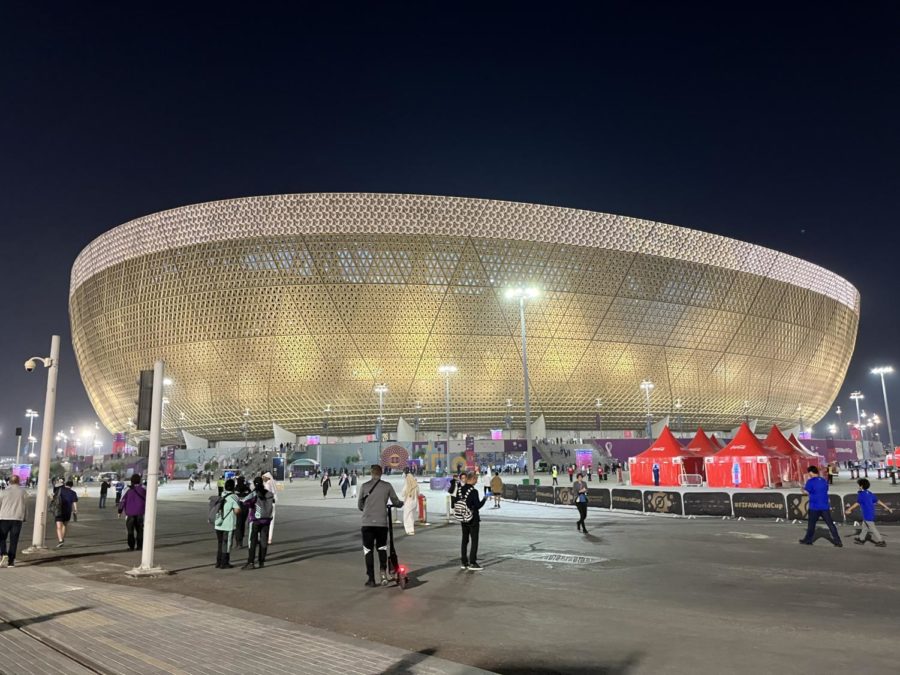In light of the social justice controversy stemming from player protest, or lack thereof, during the World Cup in Qatar, Editor in Chief Alex Levitt and Opinions Editor Penelope Stinson discuss the role of protest and human rights activism in sports and major athletic competitions.
Should the World Cup players have spoken out more on human rights injustices in Qatar?
Penelope:
Although it’s true that soccer players are not politicians, they have chosen to participate in an institution that is unethical, in a country that does not respect basic human rights. Each soccer player for the United States men’s team will be paid $294,000, and, in total, the five highest-paid players at the World Cup are expected to earn a total of $452 million this season. No one is forcing soccer players to play the game; they play and they profit. Therefore, they should be just as accountable to discuss the human rights violations in Qatar as FIFA and every other official who chose to hold the World Cup in Qatar.
While the soccer players may not be forced to play soccer, the migrant workers who laid the very ground the players walk on faced different treatment. Working under Qatar’s sponsorship system kafala, workers face insurmountable barriers to changing jobs and often fall victim to wage theft. When each migrant worker is actually paid full and on time, a rare occurrence, they make $206 dollars per month. Further, that low wage is nothing compared to the thousands of unexpected deaths of healthy workers.
Alex:
While some of the Qatari practices in preparation for the World Cup were inhumane, I believe that it’s not the obligation of the competitors to protest. These players have been training all their lives in soccer, not political rhetoric, and just because they’re exceptional on the field shouldn’t mean that they have to make political statements.
In some cases, I would encourage athletes to take a stand — after all, the World Cup is the most watched event on the globe, so any message would be received loud and clear. But what soccer players do on and off the pitch could have repercussions, as seen by the North Korean squad’s public humiliation after the 2010 World Cup. Maybe similar injustices could have occurred to players on the Qatari or Iranian sides if they had gone against their governments, so it’s not fair to say that they are obliged to speak out.
Should sports institutions continue to hold competitions in countries with systemic human rights violations?
Alex:
I think that sports leagues should generally avoid sponsoring major tournaments in places with human rights abuses. Qatar’s World Cup aside, international sports events in corrupt countries send the message that human rights abuses can be brushed aside for financial benefits. Take Formula 1 as an example. In 2023, F1 will be racing in Saudi Arabia, Azerbaijan and Qatar, all countries that have had serious ethical violations, particularly for lower-class workers. Still, these countries pay massive fees to host grand prix, which is why they continue to be held despite driver protests. At the end of the day, it’s up to the league leaders to decide what is right and wrong, but human rights abuses must be recognized and avoided when possible.
Penelope:
Absolutely sports institutions should not be holding tournaments or games in countries with systemic human rights violations. Companies are prioritizing profit over people’s lives, and the countries that participate are looking to shove their dirty laundry under the bed and present a heavily filtered view of themselves.
For example, Saudi Arabia’s newly founded LIV Golf is nothing more than a $750 million play by the country to enhance its national standing and reshift the public focus from its previous human rights failures, including the assassination of Washington Post columnist Jamal Khashoggi. The Saudis have realized that it’s not just enough to hold golfing events in their country, they want to own the golfing industry itself. That’s what happens when countries are allowed to start hosting national sporting events. After a while, they will want more: more fans, more publicity and more control of the narrative. We cannot let these countries take steps toward global recognition and influence until they settle their human rights issues.
Is it ethical for fans to spectate sports that financially support unjust governments?
Penelope:
While it may not be fully ethical, it is unavoidable to have fans spectate sports that financially support unjust governments. No one should tell fans they cannot watch a sport that brings them or their loved ones joy. Research has shown that watching sports, rooting for the underdog and having your team win can truly make people happier. People who call themselves sports fans tend to have lower rates of depression, less stress and higher self-esteem than non-sports fans. The responsibility of financially supporting unjust governments should fall on the people who participate in the sports system: the players, the governments and the sports organizations. With players who speak up, governments who say no, and sports organizations who choose ethical and well-intentioned countries, the sports world can change for the better.
Alex:
I completely agree with Penelope. As she said, fans are sometimes helpless in which country their favorite sports compete. I doubt many American soccer fans wanted FIFA to be corrupted into choosing Qatar as the World Cup host, but once that decision was made, it’s unfair to ask fans to no longer watch the event. International sporting events like the World Cup bring out the best in humanity — such as competition, brotherhood and passion — so spectators who feel these emotions can’t be asked to forgo a major competition in protest. If a fan chooses to do so, props to them, but it’s an unfair ask for the general population.


